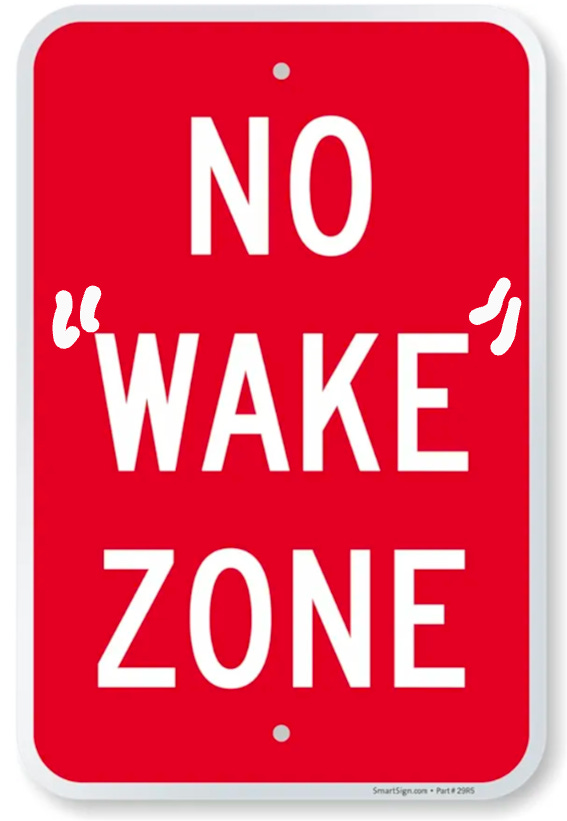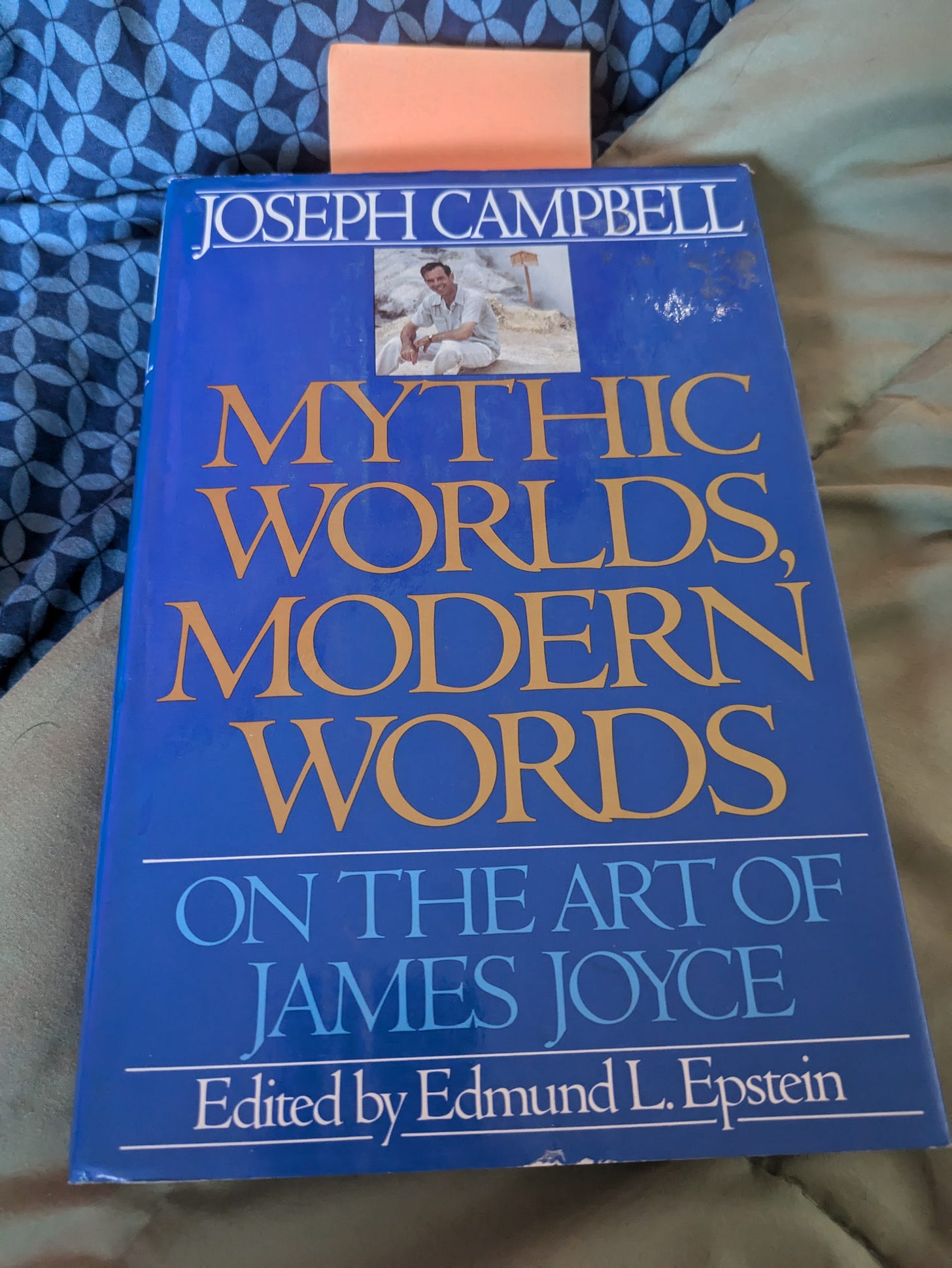So my partner, the Writer, has had us listening to an audiobook of Joyce's "Finnegans Wake" for awhile before we fall asleep each night. It was some 17 or 19 hours of audio; I don't remember which - so this has been going on for weeks now. Initially I wanted no part of it, but I certainly do want to sleep in my own bedroom, so I'm tolerating it.
After at least a week of hearing this senseless, plotless, linguistically- and intellectually-intangible collection of words and word-like sounds, I began, ironically, to listen much more closely.
No, it wasn't that I had come to like it, but I found I desired to make at least some sense of it. I listened in vain for anything resembling plot, structure, or even a declarative sentence. Not getting any of those, my brain apparently built an alternate narrative.
A few nights ago, the Writer asked what I had gathered thus far, so I summarized for him the conclusions I'd drawn so far as to what the hell the book might be about.
But I guess I'm way off? Because in response, he gave me this lovely interpretive tome that he just happened to have handy - ostensibly to "help" me understand, with the "Finnegan" part bookmarked in an idiot-proof fashion:
After a few pages of grumpy, dismayed reading, I see that, apparently, it is not correct that:
- Humphrey Chimpden Earwicker (HCE), the walrus, is also the constable
- Stapleton, the human-sized crab, isn't in love with the schoolteacher at all - he's in love with Anna Livia Plurabelle (ALP), a human woman who could either be a fan dancer or a ballerina; I'm not sure
- Finnegan, the title character, dies at a Halloween party while bobbing for apples. He gets a poisoned one, a scathing allusion to backwards European folklore published the previous century
- The schoolteacher, Euphremia, works in the hardware store with Stapleton, the human-sized crab, and HCE, the walrus, just hangs out there with them
- No one is the rabbi; there's not a rabbi. I thought it was Shem
- The conflict of the story seems to be over whether or not Stapleton, the human-sized crab, can take a day off from work at the hardware store to go to this funeral. He doesn't trust HCE, the walrus, while he's away, but HCE, the walrus, is the constable, so that isn't good - he's implying that the walrus constable will steal all his merchandise and the schoolteacher won't be able to stop it. This says something uncomfortable about society
- HCE’s son, Shaun, is a male fox on land, but whenever he dives into the ocean, he magically becomes a mermaid who antagonizes the pirates and smugglers
Understanding that HCE, the walrus, is also the constable was really the key to unlocking the whole thing, I thought smugly. But as I read the Campbell tome in mounting disbelief, I realized that apparently there might not even be a walrus! Or a human-sized crab! And no one seems to be named Stapleton at all!
Instead, this book is full of some BS about how HCE is the giant and ALP is the river. Sure! A giant and a river go together like a fish and a bicycle, right? And I thought she was a dancer!
Feeling both resentful and stupid, I descended into an evening of “Holiday Baking Championship” and refused to discuss the matter any further.
But I could not escape the dangerous power of the “Wake," for it was still playing in my bedroom the next night.
Hoping to learn at least one correct thing about the story, I lay there obediently as language and wordplay swum maddeningly around my head.
Desperate and at an all-time intellectual low, I gave myself over to God in the manner of a 12-stepper.
"Lord, I see that I am powerless in the face of early 20th century experimental British Modernist fiction. I need You to Guide me. So I leave it in Your strong arms. Please collect it and package it into something that I can wrap my head around,” I prayed.
Still the words and word-adjacent syllables refused, as usual, to actually enter my brain - to take hold in my mind as any part of a meaningful narrative.
I comprehending, picking up single words of German and French and Spanish and Italian and many words seemingly inspired by English, but totally without comprehensibly attached meaning, I stewed there fitfully.
The Writer was silent - not yet asleep; merely enjoying the story. It infuriated me.
Thus it was that slowly and surely, my blood pressure rose as I despaired of any narrative sentences at all, such as “He closed the door and locked it behind him," or “She put the teapot on the stove." It seemed all to be conversation, and murky, evasive, unintelligible conversation, at that.
Then emerged a passage consisting mostly of made-up words, all of which returned tediously, after two or three lengthy clauses, to words ending in “-ation.” There was easily three minutes of this spoken aloud.
I could feel my fist clenching, my nails digging to the heel of my hand, as I hunched resentfully behind the Writer. During the musical interlude of a chapter break, I could not help myself anymore, and so exploded.
“I'm starting to think this isn't inspired by ‘Alice in Wonderland’ at all!" I shrieked, finally unable to contain myself.
He couldn't even look at me.
“It's not," he said after a moment, tired, tired of me, and tired of defending arguably the 20th century's greatest Irish creative genius. “It's inspired by …” Words failed him. "By world mythology and … a bunch of other stuff,” he finished irritably.
Shocked, I relented and lay there quietly, listening with futility.
And to be fair, I can't say why, precisely, I thought that it was inspired by ‘Alice in Wonderland.’ I was just certain I'd read that somewhere. But no.
It certainly wasn't in the Campbell volume, anyway, I realized.
I listened a few minutes more, still unable to make heads or tails of the scene. Finally I whispered, "I gotta go take some meds, honey. I'll be back.”
"Okay,” he said, rolling over contentedly. I'm sure he thought I was referring to the many types of medication I take for a long-ago injury that has become a disability.
But reader, it wasn't.
It was edibles.






